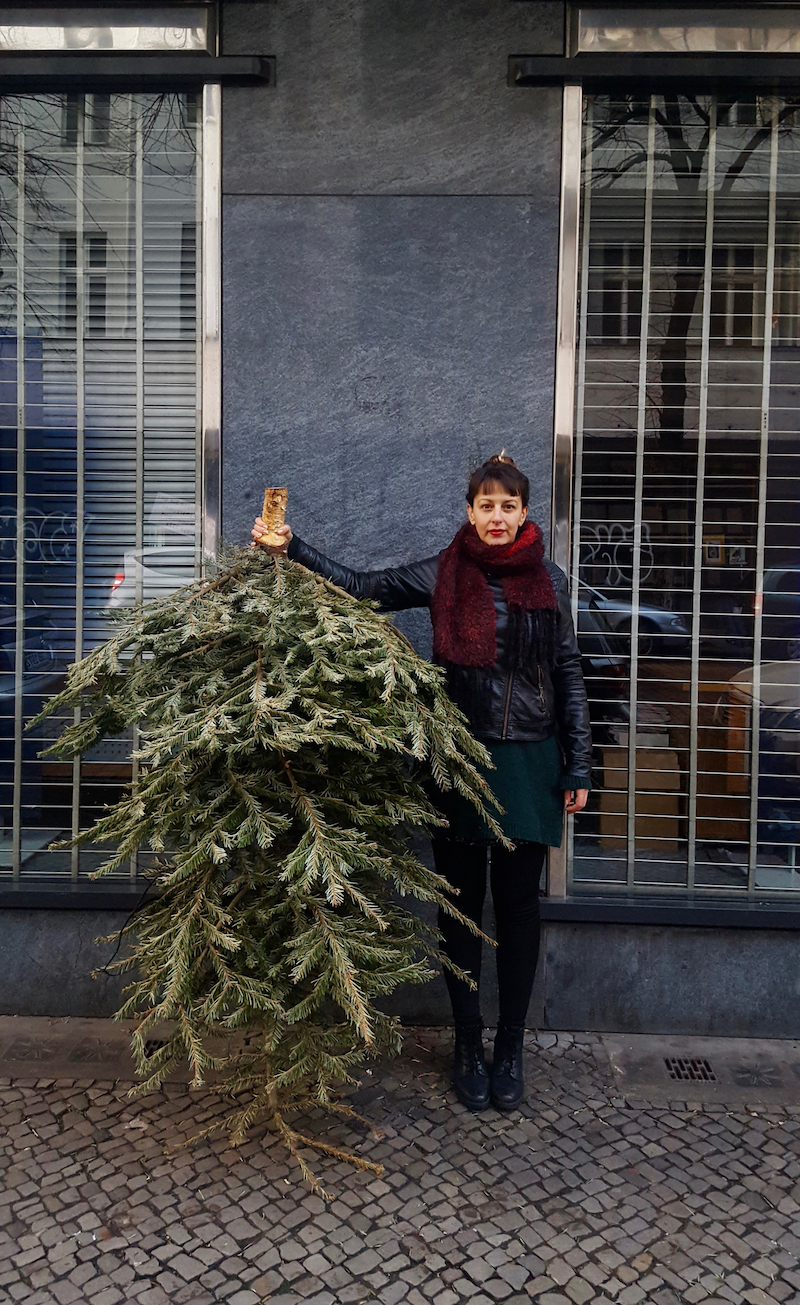 Işıl Eğrikavuk "Vilem Flusser and I," portrait, Berlin, 2018
Işıl Eğrikavuk "Vilem Flusser and I," portrait, Berlin, 2018
Mine Kaplangı: Işıl, you are an artist, writer, researcher, scholar and – perhaps the core of all other aspects – a community builder. Most of your works underline the importance of collective production as creating an opportunity for artists from many different fields to work together. Considering this side of your art practice what do you think about today's concepts like “art”, “artist” and “artwork” among the fields of your interests and research? Do you think that future will blur the boundaries between those terms and concepts?
Işıl Eğrikavuk: Its so nice to hear this from people outside. I actually did write my masters thesis on Community Art Practices when I was a student at the Art Institute of Chicago, but its also part of my character. I enjoy collaborating with people, and not necessarily with artists. When I look back at my projects now, it includes such a diverse group, professional news anchors in Sharjah, a doctor from Iraq working on cancer treatment in the US, coal mine workers in Germany, shop owners including a barber, a real estate guy, a traditional coffee house owner in Istanbul, a professional chef, a group ecologists, musicians, students, artist friends… The list goes on and on. Collaborative work is very important and also fun to me, and I even see my teaching as community building. It also has a bit to do with my journalistic instincts – I’ve worked for several years as a reporter and editor in Turkey, I am always interested in other people’s stories.
I am not an artist who isolates herself in the studio. I like getting inspired by what is going on around me. This can sometimes be personal, but also very much political, social or ecological. So the works become quite site and time specific, but also not hard to communicate. I was very surprised to see that the song we wrote with the famous rapper Fuat became viral in Turkey after Gezi protests. It’s called “Karar Bizim” [Our Decision]. Some people even made a music clip without my knowledge and put it on Youtube. So in that sense – yes, it is my work, but also everyones'.
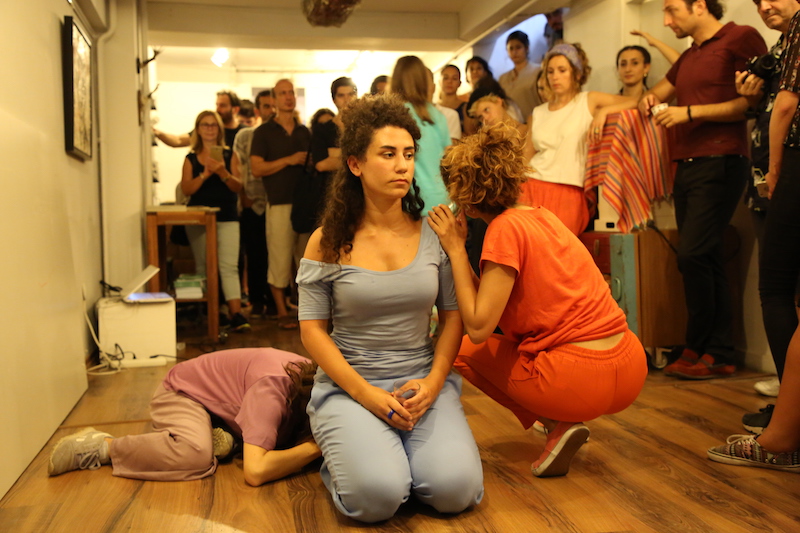
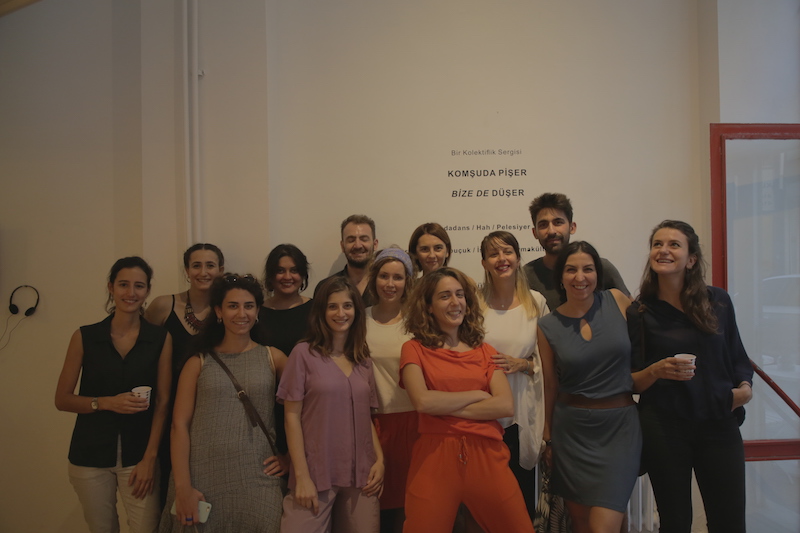 Top: "Dadans'" performance and below artists together, both at the exhibition project of "Maybe We Will Benefit From Our Neighbours' Good Fortune," at Halka Sanat, Istanbul, 2017 © Işıl Eğrikavuk
Top: "Dadans'" performance and below artists together, both at the exhibition project of "Maybe We Will Benefit From Our Neighbours' Good Fortune," at Halka Sanat, Istanbul, 2017 © Işıl Eğrikavuk

 Top: "Dadans'" performance and below artists together, both at the exhibition project of "Maybe We Will Benefit From Our Neighbours' Good Fortune," at Halka Sanat, Istanbul, 2017 © Işıl Eğrikavuk
Top: "Dadans'" performance and below artists together, both at the exhibition project of "Maybe We Will Benefit From Our Neighbours' Good Fortune," at Halka Sanat, Istanbul, 2017 © Işıl Eğrikavuk
MK: Last September you’ve curated an exhibition called “Komşuda Pişer Bize de Düşer” [Maybe We Will Benefit From Our Neighbour’s Good Fortune], which was held at Halka Sanat in İstanbul. The exhibition was focused on inviting art collectives and initiatives from Turkey to create together as a parallel to your own art practice. Could you tell me more about that exhibition and your curatorial experience?
IE: I liked curating and to be honest I thought its not as complicated as some people make it sound. Perhaps because it is very similar to the nature of how I already work. The exhibition was actually thematised on collectivity. We had artist collectives, food collectives, Istanbul permacultural collective and also people working on urban growth. And I totally believe that if you really put your heart in it and approach things with good energy, the outcome reflects it. The idea for this exhibition came actually from an academic project I was part of in the university I was teaching at in Istanbul. We were specifically looking at forms of political protest and especially Gezi. After a long research, I actually decided not to repeat Gezi but look into its trajectories. What is happening today and now in reflection to that… For me and for many artists I spoke with, one major trajectory was the collaborative action, the coming together of artists and also a conscious effort to rethink our relationship how we grow and produce green environments, food and waste. This also reflected on the exhibition. We had do-it-yourself workshops, food related events, performances, and talks as well as actual artworks. It was important for me to do it on the Asian side of Istanbul, which is art-wise not as visible as the European side.
MK: You have recently moved to Berlin and currently you are giving lectures at the media department in Universitat der Künste Berlin. How did this transition affect your life and work?
IE: Yes, I started teaching at the UDK as of October 2017 and I am teaching a class called Artistic Research. I really like the university and my colleagues are very supportive, but I still feel like I am in the orientation process. Especially because I am learning the language and getting used to a whole other system of thought. But of course it is very interesting to be Turkish in Germany due to the long-existing Gastarbeiter Turkish community here and due to strong stereotypes in peoples’ minds. I am of Turkish origin, but I am also quite American due to my education, I am a feminist and I am an academic teaching at a very good university. I challenge these stereotypes and I can see how people react to it. One thing that I hear a lot is that I don’t look or act like a Turkish person. This makes me think a lot. “What is a Turkish woman in your mind?” It is strange when people stereotype just by looking at your origins.
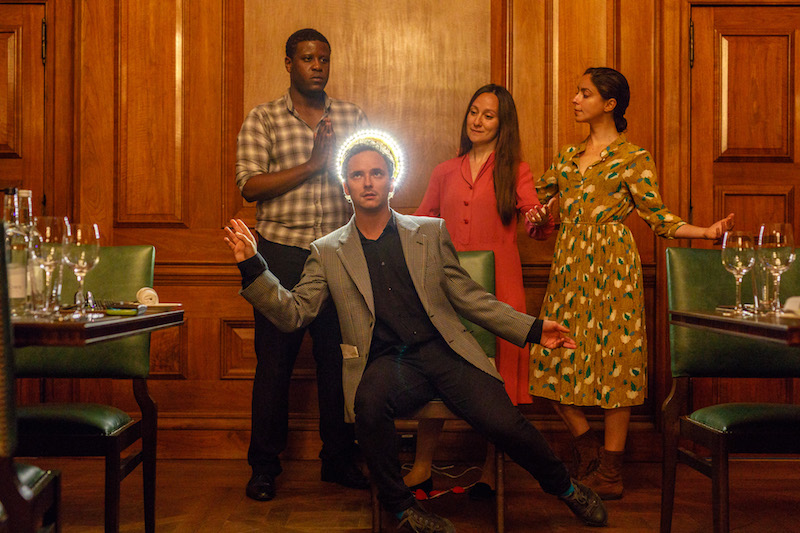
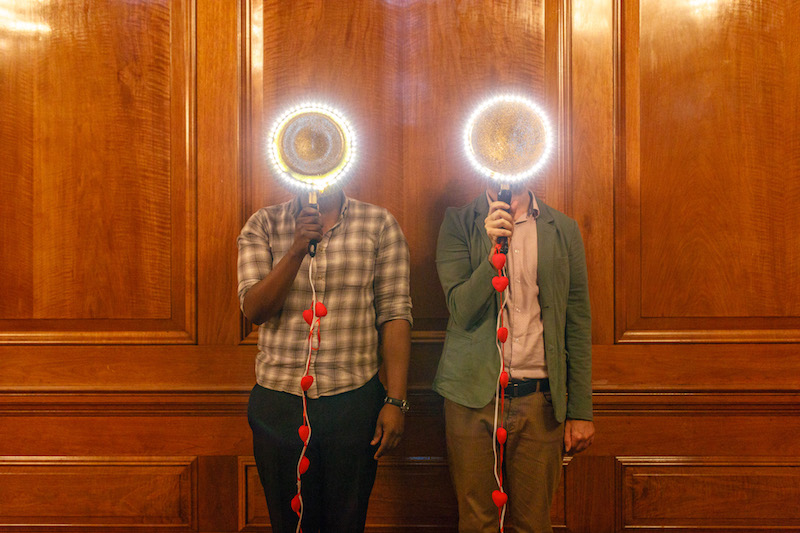
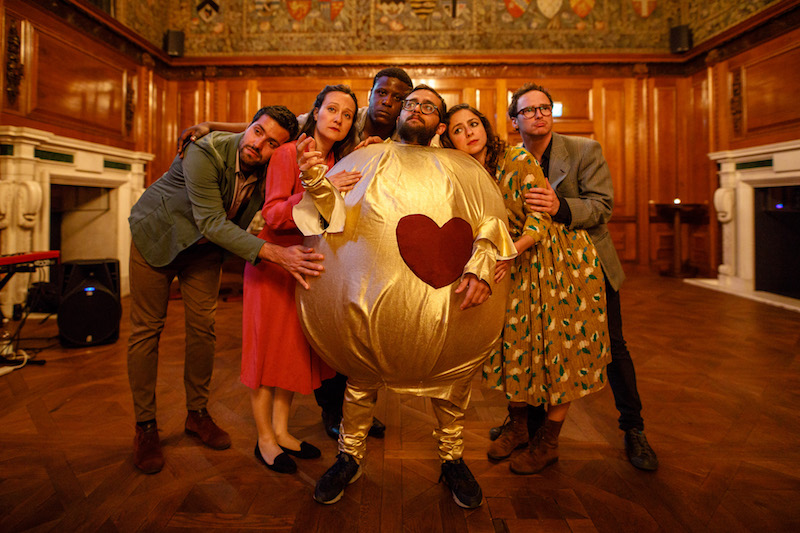 Işıl Eğrikavuk, "Pluto's Kitchen," 2017. Courtesy of Block Universe and Open Space Contemporary.
Işıl Eğrikavuk, "Pluto's Kitchen," 2017. Courtesy of Block Universe and Open Space Contemporary.
MK: You did a dinner performance called “Pluto’s Kitchen” which took place in London for the first time, in April and May 2017. How did this project start and evolve?
IE: I am sure some people have heard, but the planet Pluto’s status was downgraded from being a planet to being a dwarf planet around 10 years ago. Thus it is not one of the major nine planets anymore. When I first read about it, I was very surprised that we as humans could decide for the status of celestial being that has been there for billions of years. Later, in 2017, I was invited to be part of Block Universe performance art festival in London. It was also right after the Brexit decision and there was a lot of debate about the effects of parting with the EU. Although Brexit is political, it is also very cultural. I was seeing these caps on the Internet, where on the one side there is all the nice European cheese, sweets, wine and sausage and on the other side only a can of beans. I started to think about food in terms of a union and what it means to break up from this union and I thought of a performance about break-ups.
I decided to construct a dinner-performance with actors reading break up letters throughout the dinner. And these break up letters I wrote were sometimes from personal experiences, sometimes Pluto’s break up letter and sometimes the UK Prime Minister Theresa May’s Brexit Speech. But, on the other side I also worked together with a chef, and we prepared a menu that mimics the stages of a relationship. It starts from ice, then becomes a growing pie, then a garden and in the end it becomes a take-home pickle jar. I loved working on this piece, both because it was very personal, but also because my father is a cook. Cooking has always been very present in my childhood and even in my adult life. It is work, it is labour, it is emotion and it is a common experience, and overall a basic need that is a major part of culture. I want to re-do it in a different context in Germany.
MK: What is the starting point of your performances? What kind of stages do you go through while working on a new performative and collectivity-based work?
IE: The core of my practice is writing. I am really interested in stories and story-writing. But it involves a lot of research too. For example, when I worked with coal miners in Dortmund several years ago, I spent a lot of time in the mines in Ruhr area, interviewing the former workers and also just spending time with them. This part of Germany is very rough and interesting because many former coal mines have been turned into museums and the ex-miners are still living around it without any access. I found this very interesting. Then I wrote a fictional story about a former Turkish mine-worker who decides to establish Germany’s biggest coal mine museum with a 5 million Euro investment, but instead of displaying objects, he decides to display ex-miners in the museum and have them tell the visitors their memories. I convinced a Turkish ex-miner to be play the role and we shot a video. It is called “Memory Museum” and it is talking about this fictional museum as if its real, but actually talking about the unemployment issue in the region, the culture, access and integration.
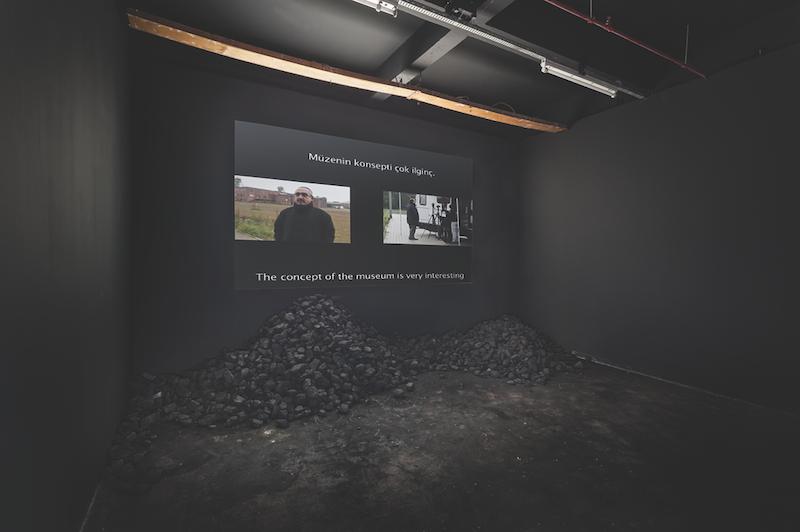 Işıl Eğrikavuk "Memory Museum," Video Installation, 2010
Işıl Eğrikavuk "Memory Museum," Video Installation, 2010
MK: You have recently been invited to give a distinguished Alumni Lecture for the Visiting Artists Program at The School of The Art Institute in Chicago this March. This program has invited artists such as Wafaa Bilal, Tania Bruguera, Mark Dion, Sarah Vowel and many others – I assume this must be very exciting for you. What will your performance-lecture for this program be about?
IE: It has been ten years since I graduated from The School of The Art Institute in Chicago and it’s an honour to be back with such an occasion. I am actually really excited, because I used to always go to these lectures as a student. I like it when such speeches are personal, honest and almost like story-telling rather than theorising or patronising the others. So this is how I imagine it to be. Of course I will talk about the political frame in the background of my works, but this is almost like talking about Brexit in terms of food. So I am planning my talking about my work over a framework of stories.
MK: Could you tell me more about your upcoming projects and what you have been working on recently?
IE: Due to my current move, I am thinking a lot about the position of the exile. Although I am not necessarily a forced exile, as an artist, as a woman, as a politically active person, as an intellectual, an academic, I feel unrooted. In a way, we are the new Gastarbeiter here and I am thinking a lot about what this means for both sides. I have been reading Vilem Flusser recently and started a photo-performance series [see first image] ]based on his writings on this topic. I will also be giving an artist talk in Block Museum, Chicago coming up this March (-> Facebook Event).
http://isilegrikavuk.net
http://isilegrikavuk.net
